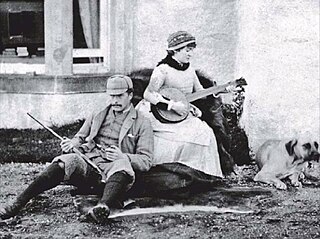
Edward Marjoribanks, 2nd Baron Tweedmouth,, was a moderate British Liberal Party statesman who sat in the House of Commons from 1880 until 1894 when he inherited his peerage and then sat in the House of Lords. He served in various capacities in the Liberal governments of the late 19th and early 20th centuries.

The Parliamentary Secretary to the Treasury is the official title of the most senior whip of the governing party in the Parliament of the United Kingdom. Today, any official links between the Treasury and this office are nominal and the title of the office can be seen as a sinecure that allows the incumbent to draw a Government salary, attend Cabinet, and use a Downing Street residence, traditionally 12 Downing Street.

Matthew White Ridley, 1st Viscount Ridley,, known as Sir Matthew White Ridley, 5th Baronet, from 1877 to 1900, was a British Conservative statesman. He notably served as Home Secretary from 1895 to 1900.
Berwickshire was a county constituency of the House of Commons of the Parliament of the United Kingdom from 1708 to 1918, when it was amalgamated with neighbouring Haddington(shire) to form a new Berwick and Haddington constituency.
Dudley Coutts Marjoribanks, 1st Baron Tweedmouth, also known as the Laird of Guisachan and Glenaffric, was a Scottish businessman and a Liberal politician who sat in the House of Commons from 1853 until 1880, when he was elevated to the peerage as Baron Tweedmouth. He was the breeder of the first golden retriever.

Baron Tweedmouth, of Edington in the County of Berwick, was a title in the Peerage of the United Kingdom. It was created in 1881 for the businessman and Liberal politician Sir Dudley Marjoribanks, 1st Baronet, widely remembered after his death as the creator of the Golden Retriever. He had already been created a baronet, of Guisachan in Beaulieu in the County of Inverness, in the Baronetage of the United Kingdom 1866. The 1st Baron was succeeded by his son, Edward, also a Liberal politician, who notably served as First Lord of the Admiralty between 1905 and 1908. The title became extinct on the death of Edward's son, the 3rd Baron, in 1935.
Hythe was a constituency centred on the town of Hythe in Kent. It returned two Members of Parliament to the House of Commons until 1832, when its representation was reduced to one member. The constituency was abolished for the 1950 general election, and replaced with the new Folkestone and Hythe constituency.

Clan Marjoribanks is a Scottish clan of the Scottish Lowlands.

Sir James Weir Hogg, 1st Baronet, was an Irish-born businessman, lawyer and politician and Chairman of the East India Company.
Marjoribanks is a surname. Notable people with the surname include:

The Golden Retriever is a Scottish breed of retriever dog of medium size. It is characterised by a gentle and affectionate nature and a striking golden coat. It is commonly kept as a pet and is among the most frequently registered breeds in several Western countries. It is a frequent competitor in dog shows and obedience trials; it is also used as a gun dog and may be trained for use as a guide dog.

Regent Terrace is a residential street of 34 classical 3-bay townhouses built on the upper south side of Calton Hill in the city of Edinburgh, Scotland. Regent Terrace is within the Edinburgh New and Old Town UNESCO World Heritage Site inscribed in 1995.

David Robertson, 1st Baron Marjoribanks, was a Scottish stockbroker and politician.

Charles Albany Marjoribanks was a Scottish Liberal politician who sat in the House of Commons from 1832 to 1833.

Sir John Marjoribanks, 1st Baronet was a Scottish MP and twice Lord Provost of Edinburgh.

Sir Henry Bruce Meux, 3rd Baronet was an English baronet, the son of Sir Henry Meux, 2nd Baronet (1817–1883), a brewer and politician.
Stewart Marjoribanks was a British Whig politician, and wine merchant.
Archibald Stewart of Mitcham MP (1697–1780) was an 18th-century Scottish merchant and politician who served as Lord Provost of Edinburgh during the critical Jacobite Rebellion of 1745. He was imprisoned in the Tower of London for over a year owing to his alleged negligence.

The Marjoribanks baronetcy, of Lees in the County of Berwick, was created in the Baronetage of the United Kingdom on 6 May 1815 for John Marjoribanks, Member of Parliament for Buteshire and Berwickshire and Lord Provost of Edinburgh. The title became extinct on the death of the fourth Baronet in 1888. The first Baronet's fourth son was David Robertson, 1st Baron Marjoribanks.